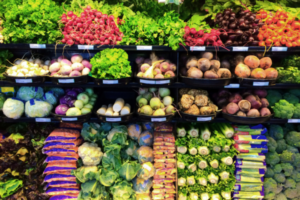Introduction
“Organic food is essential for a healthy lifestyle, offering nutrient-rich, chemical-free options that boost well-being. Starting an organic food store can turn this demand into a profitable business.”
With the rising awareness about health and sustainability, organic food stores are becoming increasingly popular. People are actively seeking healthier alternatives to conventionally grown food, and an organic food store that offers fresh, pesticide-free products can cater to this growing demand. The Indian organic food market was worth USD 1,013.4 million in 2021 and is further projected to reach USD 3,594.0 million by the year 2028, growing at a CAGR of 19.90% in the forecast period.
The market is growing at a high rate owing to the rising consumer shift towards healthy and nutritious food with zero chemicals and the rising penetration of organic food products. Furthermore, government regulations regarding the safety and quality standards of organic food are further anticipated to influence the Indian organic food market growth in the forecast period. If you’re passionate about healthy eating and want to start your own organic food business, this guide will walk you through the essential steps—from planning your business to sourcing products and building a strong brand.
1. Understanding the Organic Food Market
Before jumping into the organic food business, it’s important to understand the market trends and consumer preferences. The demand for organic products is growing as consumers become more aware of the health risks associated with pesticides, GMOs, and processed foods. Moreover, consumers today are more eco-conscious, seeking sustainable, locally sourced, and organic products.

Action Steps:
- Research Your Target Audience: Identify who your potential customers are. They may include health-conscious individuals, families, fitness enthusiasts, and those seeking eco-friendly products.
- Study Market Trends: Stay updated on organic food trends. Popular products include organic vegetables, fruits, grains, dairy, and health supplements. Organic skincare and eco-friendly household products are also seeing growing demand.
Tip: Use online research, competitor analysis, and customer surveys to gain insights into the organic food market in your area.
2. Create a Business Plan
A well-structured business plan is the foundation of a successful organic food store. Your business plan should cover everything from identifying your niche to outlining operational details and marketing strategies.
Key Sections of Your Business Plan:
- Business Concept: Define your store’s niche. Will you focus on fresh organic produce, packaged organic goods, or a combination of both? Will you offer online sales, delivery, or a physical store?
- Target Market: Clearly define your target customer demographic, such as health-conscious urban dwellers or families looking for safe, organic food options.
- Product Sourcing: Detail how you will source organic products. Will you work with local farmers or organic wholesalers? Ensure your suppliers are certified organic.
- Budget and Financials: Outline the initial capital needed to start your store, including inventory, rent, equipment, licenses, and marketing. Project your expected sales, costs, and profit margins.
- Marketing and Sales Strategy: Plan how you will attract customers, whether through local promotions, digital marketing, or partnerships with organic brands and influencers.
Action Step: Write a detailed business plan that lays the groundwork for your organic food store, covering all key operational and financial aspects.
Still unsure about your business plan? Talk to our expert today and get personalized guidance to craft a successful strategy for your organic food store
3. Choose Your Niche and Product Range
Organic food stores can offer a wide variety of products, but it’s important to start with a niche that will differentiate you from competitors. Specializing in a particular category of organic products can help you attract a specific audience.
Popular Niches for Organic Food Stores:

- Organic Fresh Produce: Focus on fruits, vegetables, and herbs that are locally grown and pesticide-free.
- Packaged Organic Products: Stock organic grains, pulses, dairy, spices, oils, and snacks that are certified organic.
- Organic Personal Care: Offer eco-friendly, chemical-free skincare and beauty products that appeal to customers who prioritize holistic wellness.
- Organic Supplements and Superfoods: These include organic health supplements, teas, protein powders, and superfoods like chia seeds, quinoa, and flaxseeds.
- Eco-Friendly Household Products: Provide a range of sustainable, biodegradable cleaning products, utensils, and packaging materials.
Action Step: Choose a product range that aligns with your brand vision, customer demand, and sourcing capabilities.
4. Find Reliable Organic Suppliers
Sourcing certified organic products is critical to maintaining trust with your customers. Whether you’re sourcing fresh produce from farmers or packaged products from wholesalers, ensure that all your suppliers are certified organic and meet the necessary standards.
Action Steps:
- Local Organic Farms: Build relationships with local farmers who grow organic produce. You can even create partnerships where the farmers grow specific items for your store.
- Certified Organic Distributors: If you plan to stock packaged goods, work with certified organic wholesalers. Always verify that the products are labelled with recognized certifications such as USDA Organic, India Organic, or EU Organic.
- Regular Quality Checks: Periodically check the quality of the products you receive to ensure they meet organic standards and are fresh.
Tip: Attend organic food expos and trade shows to network with suppliers and learn more about sourcing high-quality organic products.
5. Set Up Your Store and Operations
Once you have sourced your products, it’s time to set up your store. You can choose between a physical store, an online store, or a combination of both. Each option has its own setup process and considerations.

a) Setting Up a Physical Store:
- Location: Choose a location with high foot traffic or near neighborhoods with a health-conscious population. Ensure it’s easily accessible.
- Store Design: The layout should be clean, inviting, and reflective of your brand’s eco-friendly, organic values. Use eco-friendly materials like bamboo shelves, recyclable packaging, and paper bags.
- Inventory Management: Ensure your store has enough storage space for perishable and non-perishable goods. Invest in refrigeration units if you stock fresh produce.
b) Setting Up an Online Store:
- E-commerce Platform: Choose a reliable platform like Shopify, WooCommerce, or BigCommerce to build your online store. Ensure it’s mobile-friendly, user-friendly, and supports secure payments.
- Delivery and Logistics: Offer timely delivery with eco-friendly packaging. You can either partner with third-party logistics providers or hire your delivery team.
- Customer Support: Set up a support system to handle inquiries and complaints efficiently. Offering live chat or WhatsApp support can enhance the customer experience.
Action Step: Whether you opt for a physical or online store, make sure the setup reflects your commitment to quality, transparency, and sustainability.
6. Obtain Necessary Licenses and Certifications
Running an organic food store requires adherence to local regulations, food safety standards, and organic certifications.
Important Licenses and Certifications:
- FSSAI License: In India, the Food Safety and Standards Authority of India (FSSAI) license is mandatory for all food businesses. It ensures your store complies with food safety standards.
- GST Registration: You will need to register your business under the Goods and Services Tax (GST) and charge tax on your sales.
- Organic Certification: Ensure that your suppliers are certified organic by recognized authorities like India Organic, USDA Organic, or PGS India. If you offer fresh produce, confirm that it meets the necessary certification standards.
- Shop and Establishment License: This license regulates the working conditions, hours, and employee wages in your store. It’s issued by the local municipal authority.
Ready to register for your license? Contact MSME Story today by filling out the form!
Action Step: Ensure you have all the necessary licenses and certifications before opening your store to ensure compliance and build customer trust.
7. Marketing Your Organic Food Store

To attract customers and build a loyal following, you’ll need a robust digital marketing strategy alongside traditional marketing efforts. Digital marketing plays a crucial role in reaching health-conscious consumers who are actively searching for organic products.
Having a strong online presence allows you to engage with potential customers, increase brand awareness, and drive traffic to your store, whether physical or online.
a) Local SEO and Website Optimization:
- Optimize your website for local search terms such as “organic food store near me” or “buy organic vegetables in [City].”
- Claim your Google My Business profile to appear in local searches and Google Maps.
b) Social Media Marketing:
- Use Instagram and Facebook to showcase your fresh produce, eco-friendly packaging, and behind-the-scenes content from your suppliers. Engage your audience with organic recipes, wellness tips, and promotions.
- Run Instagram Reels and Stories highlighting the benefits of switching to organic products and showing how your products are sourced.
c) Email Marketing:
- Build an email list by offering discounts or special promotions in exchange for email signups. Send regular newsletters featuring new product arrivals, organic recipes, and tips on living a healthier lifestyle.
d) Influencer Partnerships:
- Collaborate with health and wellness influencers to promote your organic store to a wider audience. Consider running influencer-led giveaways or product reviews to increase your brand’s reach.
Action Step: Develop a marketing plan that includes
- SEO
- Social Media
- Influencer Marketing
to generate buzz and attract customers.
Discover essential digital marketing tips, tricks, and strategies to boost your organic food business! Click below to learn how to attract more customers and increase your sales.
Explore Digital Marketing Tips for Organic Food Stores 🌿
8. Offer Subscription Plans and Loyalty Programs
Customer retention is key to sustaining and growing your organic food store. By offering subscription plans and loyalty programs, you can encourage repeat business and build a loyal customer base.
a) Subscription Plans:
- Offer weekly or monthly subscription plans for high-demand items like organic fruits, vegetables, or health supplements. Customers can sign up to receive regular deliveries at discounted rates.
b) Loyalty Programs:
- Create a loyalty program where customers earn points for every purchase, which can be redeemed for discounts or free products. This incentivizes repeat purchases and customer retention.
Action Step: Set up subscription plans and loyalty programs to create a steady stream of repeat customers and enhance customer satisfaction.
Conclusion
Starting an organic food store is a rewarding business opportunity that aligns with growing consumer demand for healthier and more sustainable products. By following the steps outlined in this guide—from creating a business plan and sourcing products to setting up your store and marketing effectively—you can build a successful organic food business that resonates with health-conscious customers.
With the right combination of high-quality products, excellent customer service, and strategic marketing, your organic food store can become a trusted destination for organic living in your community.












![[object Object]](/_next/image?url=https%3A%2F%2Fcms.msmestory.com%2Fwp-content%2Fuploads%2F2026%2F01%2FInnerwear-Manufacturing.png&w=3840&q=75)
![[object Object]](/_next/image?url=https%3A%2F%2Fcms.msmestory.com%2Fwp-content%2Fuploads%2F2026%2F01%2FSaree-Manufacturing.png&w=3840&q=75)
![[object Object]](/_next/image?url=https%3A%2F%2Fcms.msmestory.com%2Fwp-content%2Fuploads%2F2026%2F01%2FDupatta-Manufacturing.png&w=3840&q=75)
![[object Object]](/_next/image?url=https%3A%2F%2Fcms.msmestory.com%2Fwp-content%2Fuploads%2F2026%2F01%2FLeggings-Manufacturing.png&w=3840&q=75)
![[object Object]](/_next/image?url=https%3A%2F%2Fcms.msmestory.com%2Fwp-content%2Fuploads%2F2026%2F01%2FSeasonal-Gift-Hampers-Manufacturing.png&w=3840&q=75)
![[object Object]](/_next/image?url=https%3A%2F%2Fcms.msmestory.com%2Fwp-content%2Fuploads%2F2026%2F01%2FRakhi-Manufacturing.png&w=3840&q=75)
![[object Object]](/_next/image?url=https%3A%2F%2Fcms.msmestory.com%2Fwp-content%2Fuploads%2F2026%2F01%2FLeather-Gift-Items-wallets-keychains-Manufacturing.png&w=3840&q=75)
![[object Object]](/_next/image?url=https%3A%2F%2Fcms.msmestory.com%2Fwp-content%2Fuploads%2F2026%2F01%2FJute-Bags-Manufacturing.png&w=3840&q=75)
![[object Object]](/_next/image?url=https%3A%2F%2Fcms.msmestory.com%2Fwp-content%2Fuploads%2F2026%2F01%2FBamboo-Crafts-Manufacturing.png&w=3840&q=75)
![[object Object]](/_next/image?url=https%3A%2F%2Fcms.msmestory.com%2Fwp-content%2Fuploads%2F2026%2F01%2FTerracotta-Clay-Product-Manufacturing.png&w=3840&q=75)
![[object Object]](/_next/image?url=https%3A%2F%2Fcms.msmestory.com%2Fwp-content%2Fuploads%2F2026%2F01%2FHandmade-Jewellery-Manufacturing.png&w=3840&q=75)
![[object Object]](/_next/image?url=https%3A%2F%2Fcms.msmestory.com%2Fwp-content%2Fuploads%2F2026%2F01%2FWooden-Gift-Items-Manufacturing-2.png&w=3840&q=75)
![[object Object]](/_next/image?url=https%3A%2F%2Fcms.msmestory.com%2Fwp-content%2Fuploads%2F2026%2F01%2FGreeting-Cards-Printed-Gifts-Manufacturing.png&w=3840&q=75)
![[object Object]](/_next/image?url=https%3A%2F%2Fcms.msmestory.com%2Fwp-content%2Fuploads%2F2026%2F01%2FCustomized-Gifts-Manufacturing.png&w=3840&q=75)
![[object Object]](/_next/image?url=https%3A%2F%2Fcms.msmestory.com%2Fwp-content%2Fuploads%2F2026%2F01%2FResin-Art-Products-Manufacturing.png&w=3840&q=75)
![[object Object]](/_next/image?url=https%3A%2F%2Fcms.msmestory.com%2Fwp-content%2Fuploads%2F2026%2F01%2FHandmade-Candles-Manufacturing.png&w=3840&q=75)
![[object Object]](/_next/image?url=https%3A%2F%2Fcms.msmestory.com%2Fwp-content%2Fuploads%2F2026%2F01%2FSpiritual-Accessories-Rudraksha-Malas-Manufacturing.png&w=3840&q=75)
![[object Object]](/_next/image?url=https%3A%2F%2Fcms.msmestory.com%2Fwp-content%2Fuploads%2F2026%2F01%2FAromatherapy-Oils-Manufacturing.png&w=3840&q=75)
![[object Object]](/_next/image?url=https%3A%2F%2Fcms.msmestory.com%2Fwp-content%2Fuploads%2F2026%2F01%2FDecorative-Candles-Manufacturing.png&w=3840&q=75)
![[object Object]](/_next/image?url=https%3A%2F%2Fcms.msmestory.com%2Fwp-content%2Fuploads%2F2026%2F01%2FDiya-ClayMetal-Manufacturing.png&w=3840&q=75)

